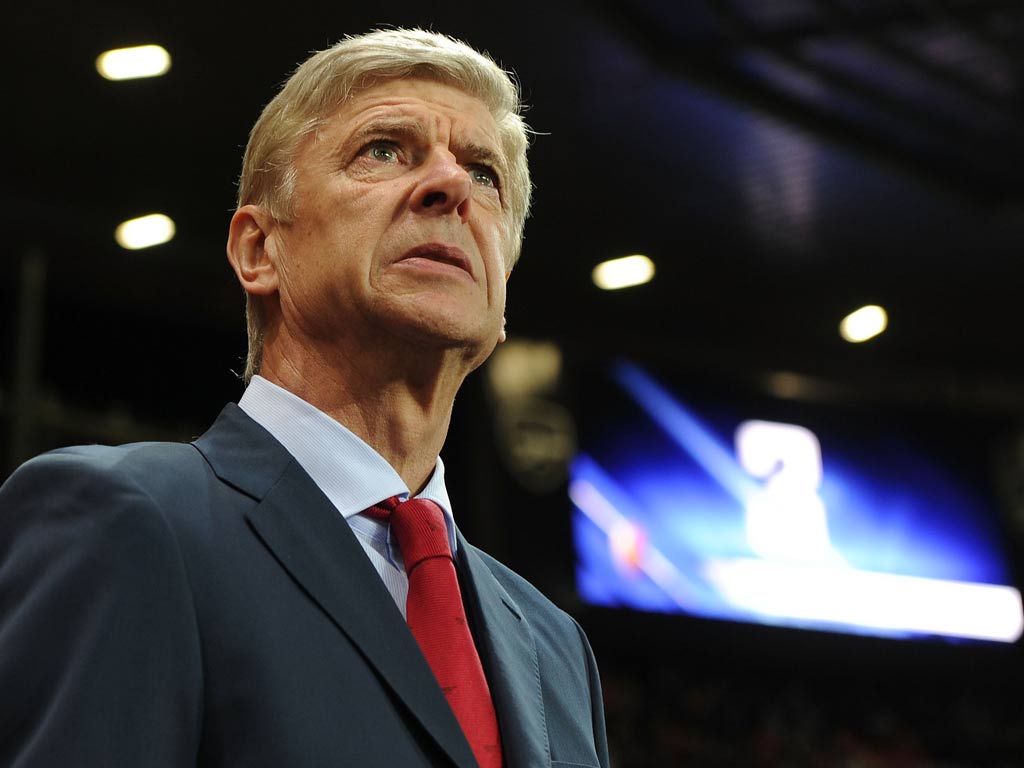Sorry Arsene, Champions League exertions are no excuse for Arsenal's woeful domestic form
Wenger has described his side as jaded, suffering a lack of sharpness, attributed to the energy expended in ensuring Champions League progress

Your support helps us to tell the story
From reproductive rights to climate change to Big Tech, The Independent is on the ground when the story is developing. Whether it's investigating the financials of Elon Musk's pro-Trump PAC or producing our latest documentary, 'The A Word', which shines a light on the American women fighting for reproductive rights, we know how important it is to parse out the facts from the messaging.
At such a critical moment in US history, we need reporters on the ground. Your donation allows us to keep sending journalists to speak to both sides of the story.
The Independent is trusted by Americans across the entire political spectrum. And unlike many other quality news outlets, we choose not to lock Americans out of our reporting and analysis with paywalls. We believe quality journalism should be available to everyone, paid for by those who can afford it.
Your support makes all the difference.Arsene Wenger is facing one of his most difficult periods as Arsenal manager. Lying 10th in the table, 15 points behind league-leaders Manchester United, the Gunners have had their worst start to a Premier League season in the Wenger era. In response to their recent poor results, epitomised by Saturday’s 2-0 home defeat to Swansea, Wenger has described his side as jaded, suffering a lack of sharpness, attributed to the energy expended in ensuring Champions League progress. This term, the North London club has advanced from the group stages of Europe’s elite competition for the 13th consecutive year. But is Wenger right to use Arsenal’s European triumphs as an explanation for their domestic woes? Does a run to the latter stages of the Champions League, more often than not, result in a dip in form back home?
There is much evidence to show this is the case. In their miraculous journeys to European glory, Chelsea and Liverpool took their eyes off their Premier League games, resulting in sixth and fifth-placed finishes respectively. Liverpool’s Istanbul victory in 2005 was historic for another reason, as it forced Uefa to make a rule change, ensuring the cup holders would also be granted a place in the next season of the competition, irrespective of their final league position. This would suggest the governing body acknowledged there is a legitimate difficulty in ensuring a high-standard of domestic performance whilst entering the latter stages of cup competitions.
Arsenal are not alone in simultaneously suffering severe domestic difficulties whilst enjoying success on the European stage. This season, despite having secured qualification to the knock-out stages, Milan and Valencia have had a torrid run of form; the Italian giants, coached by Massimiliano Allegri, are seventh in the Serie A standings, 14 points behind leaders Juventus, while Valencia have fared even worse. Languishing in mid-table, 22 points behind table-topping Barcelona, the Spanish club sacked manager Mauricio Pellegrino on Saturday following a 5-2 home defeat to Real Sociedad. In addition to Allegri and Pellegrino, Roberto Mancini and Roberto Di Matteo would also agree with Wenger’s assertions that battles cannot be fought on two fronts.
However, in this regard, the performances of Wenger’s side this campaign do not follow a coherent pattern. Recent games against Schalke and Montpellier have both been followed by underwhelming draws against Fulham and Aston Villa. Yet earlier in the season, the Gunners earned a positive result at Manchester City and victories against West Ham and QPR after Champions League games.
Taking a broader view, Wenger would argue it is the cumulative effect of the busy fixture schedule which takes its toll on his squad. In response to this claim, it can be strongly argued that the financial benefits of European success allows clubs to invest in their team, and assemble a group of players that is capable of ensuring progress in a number of cup competitions. From this viewpoint, it is not the club’s continuing participation in the Champions League which is the root cause of Arsenal’s problems, but Wenger’s failure to reap the harvest of European successes by building a bigger and more experienced squad.
The footballing record books also suggest that Wenger’s complaints might fall on deaf ears. Excluding Chelsea and Liverpool’s remarkable victories, six of the last eight Champions League winners have won their domestic leagues in the same season; Barcelona, Internazionale, Manchester United, and Porto have all completed the most prestigious of cup doubles in recent years.
Furthermore, evidence from this season indicates Wenger’s analysis is misplaced. Of the top 10 European leagues, as determined by the Uefa coefficient, seven are currently led by teams in the Champions League. Only the French, Dutch, and Russian competitions break the mould. Paris St Germain possess such a strong squad, that the French outlier may also soon fall into line.
This season could prove to be a defining one for Wenger as the chorus of dissent, emerging from the ever-lengthening wait for trophies, finally reaches its crescendo. But if the Frenchman is looking towards European success as a smokescreen for failings elsewhere, he is misguided. More often than not, domestic and European success go hand-in-hand as in-form teams are carried by their winning momentum. The 2005 rule change could prove to be Arsenal’s only source of redemption this season. With this weight of evidence, Wenger is running out of excuses.
Join our commenting forum
Join thought-provoking conversations, follow other Independent readers and see their replies
Comments